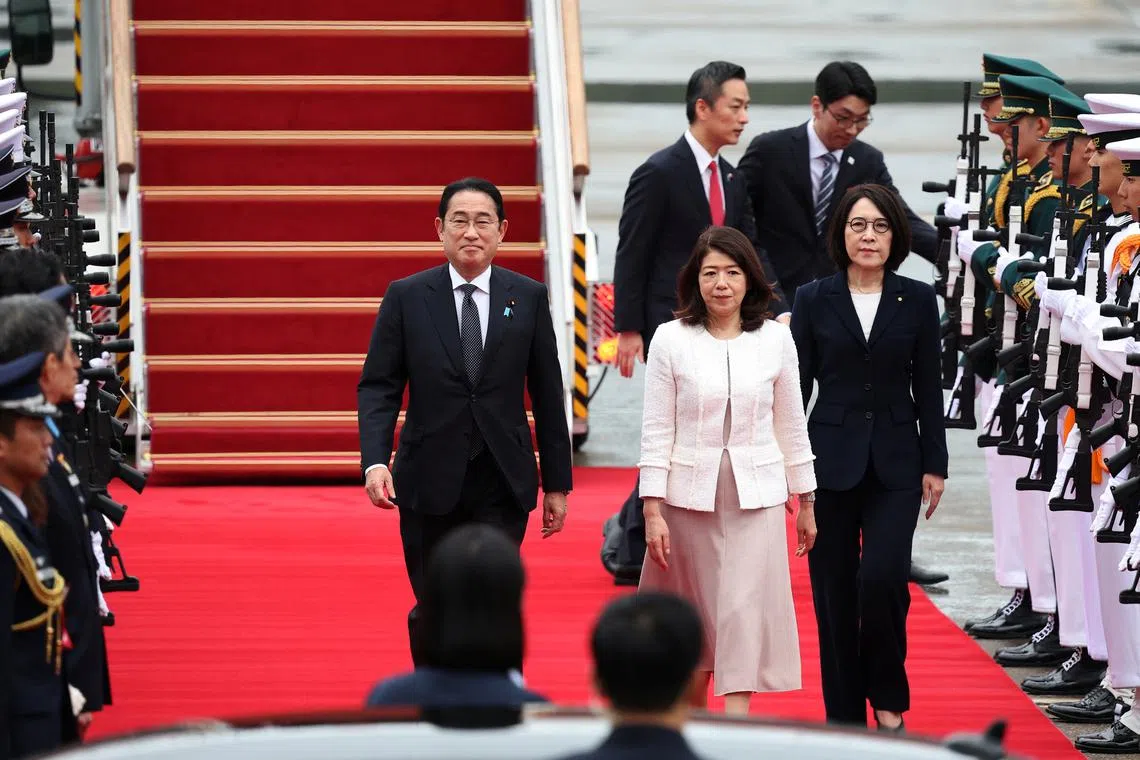Japan’s Kishida, South Korea’s Yoon call to sustain momentum in improved ties
Sign up now: Get insights on Asia's fast-moving developments

Japanese Prime Minister Fumio Kishida and his wife Yuko Kishida inspecting an honour guard in Seongnam, South Korea.
PHOTO: REUTERS
SEOUL - Japanese Prime Minister Fumio Kishida called on Sept 6 to maintain the momentum behind an improvement in relations with South Korea during a summit with President Yoon Suk-yeol in Seoul.
Mr Kishida’s final, whirlwind trip to his neighbour as leader came as the two leaders seek to seal their newfound partnership, which will be tested by imminent changes of leaders in Tokyo and Washington.
Mr Kishida, who will step down in September
“There is a lot of history... but it is very important to inherit the efforts of our predecessors who overcame difficult times, and cooperate toward the future,” Mr Kishida told Mr Yoon at the meeting.
“I’ve also said here in Seoul that I feel heartbroken that so many people have had such difficult, sad experiences in such difficult circumstances,” he added, referring to his earlier comment during a visit in 2023.
Mr Yoon also called for sustaining the positive momentum of cooperation built by the two leaders, saying next year could provide “a turning point” for the relationship to take a leap forward marking its 60th anniversary.
“There are still difficult issues remaining in Korea-Japan relations. I hope that both sides will continue to work together with a forward-looking attitude so that we can continue to take steps toward a brighter future.”
Mr Yoon has made it a diplomatic priority to mend ties with Japan and improve security cooperation to tackle North Korea’s military threats.
At a summit with US President Joe Biden at Camp David in 2023, the three leaders committed to deepen military and economic cooperation
The US is confident Mr Kishida’s successor will be as committed to continuing the renewed alliance and that “all of these projects we’ve been working on together are going to continue at pace under new leadership”, Ms Mira Rapp-Hooper, senior official at the White House National Security Council, said.
“Both Prime Minister Kishida and President Yoon took on a great deal of personal risk and political risk to move forward the warming of their bilateral ties in ways that prior governments just hadn’t been able to accomplish,” she said.
Despite the public expression of lasting partnership from the three capitals, there is a lingering question whether the Asian neighbours can maintain the kind of genuine rapprochement that will put their historic woes behind with new leaders in place.
“Even if a country’s foreign policy is dictated by its national interests and its values, the changes of government bring changes at least in the tones and approaches of foreign policy,” said Mr Kim Hyoung-zhin, former South Korean deputy foreign minister recently studying in Japan.
A small group of protesters rallied outside Mr Yoon’s office before Mr Kishida’s arrival, saying Japan has yet to atone for its wartime past.
A protest leader condemned Mr Yoon for wasting government money on a “so-called farewell trip of the outgoing prime minister”. REUTERS


